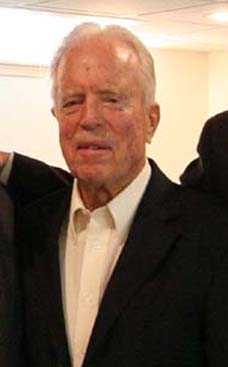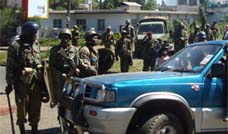
"Most of us went there thinking we'd have an opportunity to make a big difference in the world," said Bill. "But the law of osmosis says if you're one in a village of 1,000, chances are you're going to change a lot more than they are. "You realize you're not going to make a huge difference in the villagers' lives, but if you're lucky, you can make a significant difference in a few people's lives." When the Piatts left Togo again in 1986, the country's Peace Corps volunteers threw them a going-away party. The couple promised to host a Togo reunion in the states in 1989 because by then, all the current volunteers would be back in the United States. "We had a party at Buggs Island Lake [in North Carolina]," said Bill. "There were about 140 people and we had about 75 tents." But their time in North Carolina was short-lived; it wasn't long before Bill and Anna felt the urge to return to the Peace Corps. This time, they moved to Prague in 1993, where Bill served as the country director for both Czech and Slovakia.
Bill Piatt served as a Peace Corps Volunteer in Togo in the 1970's and returned as Peace Corps Associate Country Director ten years later
Bonded to the corps
Lake residents Anna and Bill Piatt discovered a lot, including each other, as Peace Corps volunteers in West Africa.
By Laurie Edwards
Laker Weekly
When Bill Piatt was finishing his last year of high school in the early 1970s, he had given no thought to what kind of career path to take.
"I knew where I was going," he said. "When they had the draft lottery, my birthday came up No. 45."
But shortly before his graduation, President Richard Nixon abolished the draft, and Bill had to make some quick decisions. His Jackson, Miss., high school received frequent visits from military recruiters, but it was a different kind of recruiter that engaged Bill -- one from the Peace Corps.
"I thought it was interesting," said Bill. "I kinda wanted to see a different part of the world. ... I thought Latin America would be nice."
When he got an invitation to go to Togo in 1974, Bill tried to remember a country in Latin America by that name. But there wasn't one. Togo is in West Africa.
Across the Atlantic Ocean and seven time zones away, Anna Kuny worried about the increasing violence in Freising, Germany where she worked as a nurse.
"I applied for the German Volunteer Service," she said. "I decided to join because I thought I would die in the town I worked."
German Volunteer Service, Germany's Peace Corps equivalent, brought her in for interviews and IQ tests. She, too, had fostered the notion of going to Latin America.
"They asked if I wanted to go to Togo," she said. "I said, 'Where's Togo?'"
Anna moved to Blitta Gare, a small village in the French-speaking country, to study lepers. She sought out leper colonies and educated villagers about the low risk of transmission if the disease is quickly treated.
Bill, who had been building an elementary school in the village, was being treated at a German military hospital for a broken elbow. When he returned to work, he met the German nurse.
"He was very skinny and he wore all these blue overalls and straw hats," said Anna of Bill. "We always spoke in French to each other until he found out I was better in English than French. He was so exotic because I only understood half of what he was saying."
Bill had been quick to notice that the German volunteers had more luxuries than the Americans, including electricity, hot running water, personal transportation and salaries based on their German professions.
"Ours was a living allowance based on what we needed to get by," said Bill, who was living in Sotouboua. "I put buckets in the sun to make the water warm [for showers]."
Still, the pair shared a common bond -- "The Peace Corps bond," said Bill.
"Peace Corps is the only organization on Earth that sends its citizens to live alone, completely imbedded in another country's society to achieve goals set by another country," he said.
"It's such a personally intense experience that only someone else who has been in that intensity of aloneness can truly understand it."
Finding common ground
Togo was alien to both of them, with new smells, foods and ways of life. The prominent religion is Vodun, which traveled to the United States with slavery and evolved in Louisiana as voodoo.
Common food in the country included fufu, which consists of pounded yams and fermented corn mush served with a sauce of tomatoes, hot peppers, vegetables, goat or chicken.
"It's always eaten with your fingers," said Anna. "Everyone eats from the same bowl."
Other common foods were large yams that were cooked in a fire and agouti, or cane rats, a common bush meat in Togo.
When they took a few days off from working, they'd travel to Lome, the capital, to eat at the restaurants and relax in the pools.
"Lome was 200 miles away," said Bill. "It was a day's ride on public transportation, a pickup truck with a cover and two wooden benches."
By the time the truck arrived in Lome, it was usually packed with not only people, but goats and chickens as well.
The couple fell in love, and when Anna left the volunteer service in 1977 and moved to Germany, Bill followed her in January 1978. They were married that August.
They enjoyed a brief time together before Bill returned to the United States in November without his wife.
"The U.S. wouldn't let me bring her with me because I didn't have a job," he said. "I had to prove we were financially independent."
Bill accepted a job in marketing with IBM. The company was required to write a letter to Immigration verifying his working status so Anna could come into the country.
Bill sent Anna a telegram she received on Christmas Eve 1978 to inform her of his new job status, and in March 1979, Anna joined him in Memphis, Tenn.
"It was my first time in the states," she said. "It was raining and it was muggy ... I said there's nothing but fields and cotton. It looks just like Togo."
After a few years in Memphis, work kept the Piatts from spending familly time with their two children -- Christian and William Frederick.
"We finally decided this was not living," said Anna.
They wanted to venture back overseas, but Bill's boss at IBM said it would take 10 years and five relocations to attain a job overseas with his company. The Peace Corps made a better offer.
"My old boss from Togo called and said the associate director position was going to be available," said Bill. "There was five or six candidates. ... We got the job."
En route to Washington, D.C., where Bill would take his new orders and they would fly to Africa, the couple stopped in North Carolina and bought 10 acres of land so they'd have a place to return.
After a year as associate director, Bill was named country director, a position he held for three years.
Making a difference
"Most of us went there thinking we'd have an opportunity to make a big difference in the world," said Bill. "But the law of osmosis says if you're one in a village of 1,000, chances are you're going to change a lot more than they are.
"You realize you're not going to make a huge difference in the villagers' lives, but if you're lucky, you can make a significant difference in a few people's lives."
When the Piatts left Togo again in 1986, the country's Peace Corps volunteers threw them a going-away party. The couple promised to host a Togo reunion in the states in 1989 because by then, all the current volunteers would be back in the United States.
"We had a party at Buggs Island Lake [in North Carolina]," said Bill. "There were about 140 people and we had about 75 tents."
But their time in North Carolina was short-lived; it wasn't long before Bill and Anna felt the urge to return to the Peace Corps. This time, they moved to Prague in 1993, where Bill served as the country director for both Czech and Slovakia.
Upon settling in Prague, the couple soon discovered that the way of life was quite different than life in the United States or Togo. After the Piatts found a house outside of town, they put up a basketball goal for their two sons, believing it would be a good way for the boys to interact with the neighbors.
Bill soon received a letter from the police department telling him it was illegal to erect a basketball goal. When he argued that he was doing it for the social good of the neighborhood, the police suggested he move the goal to the park.
After Bill noted that there were abandoned cars in the park, making it less than ideal for the goal, the police said he could leave the basketball goal where it was.
But six weeks later, he received another letter, notifying him that he'd violated a secret law. He asked his secretary about the letter, and she informed him that there were countless secret laws.
"'How do you know when you've violated them?' I asked her," said Bill. "'When they tell you,' she said. I thought, so this is communist mind control."
Money woes
In 1995, President Bill Clinton's administration and Congress were in a standoff over the national budget.
"We didn't know what was going to happen with the Peace Corps," said Bill. "We almost ran out of money."
Without funds, 6,000 volunteers were at risk of being stranded penniless across the world.
Mark Gearan, Peace Corps director, was able to gain authorization through both the Clinton administration and Congress to approve a Peace Corps budget. While the rest of the country awaited a national budget, the Peace Corps volunteers were able to keep working.
Bill left his final mark on Peace Corps in the late '90s when he was working as chief information officer for the Office of Planning Policy and Analysis. He was in charge of relocating the Peace Corps headquarters over a three-year period. As a final touch, the Duke graduate chose Duke blue awnings for the building.
Making a life on the lake
Bill now works as CIO of International Finance Corporation, and Anna works as an occupational health nurse.
In 2000, they attended a parents' weekend at the lake for their son William Frederick, who was attending Roanoke College.
"Anna was sitting on a bench in the state park and she was looking over the water and the mountains, and she said, 'For this, I would sell the other place,'" said Bill.
Within three months, they had a contract on a waterfront lot in Huddleston and a contract ready to sell their home on Buggs Island Lake.
But their volunteer work is never far from mind. In 2003, they hosted a second Togo reunion, with 80 partygoers and five houseboats tied up at their dock.
As Anna said, "Once Peace Corps, always Peace Corps."










